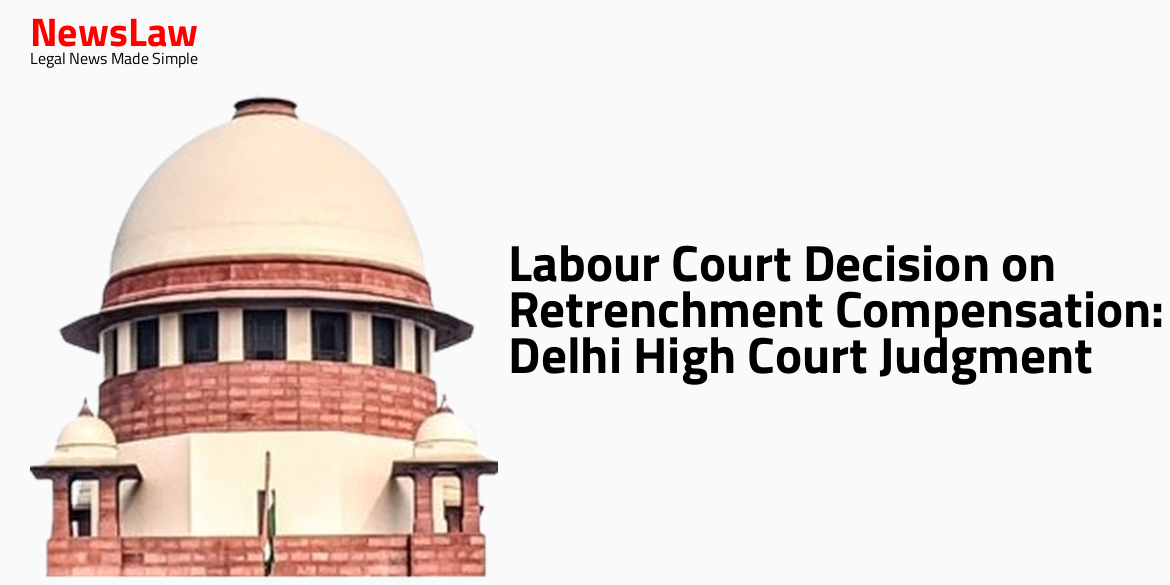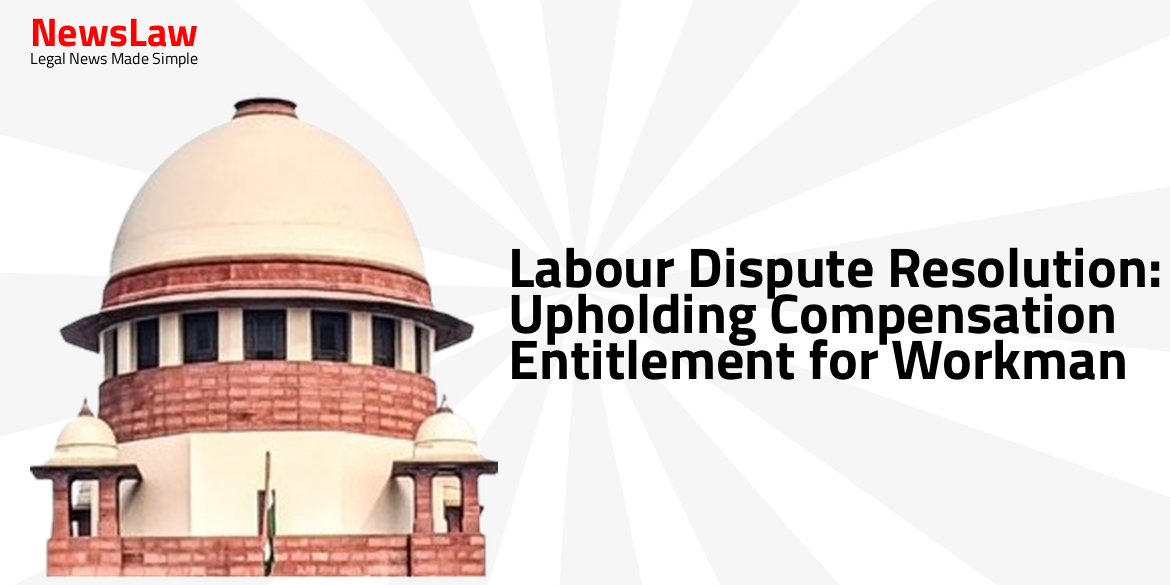In a recent judgment by the Delhi High Court, the decision of the Labour Court on retrenchment compensation for a workman against a management was examined. The case delved into the interpretation of designation and calculation of compensation as per the Industrial Tribunal’s stayed award. The Court’s ruling sheds light on the application of Section 25-F of the I.D. Act and the obligation of employers during retrenchment. Let’s explore the implications of this significant legal decision.
Facts
- The Labour Court failed to appreciate that the workman has always been receiving a salary for unskilled work and never objected to it.
- The Industrial Tribunal’s judgment in the designation case did not provide a skilled designation as per the scheduled employment rates notified in Delhi.
- The workman’s salary was prescribed for unskilled work, and no objections were raised during their tenure with the management.
- The Labour Court misapplied the stay provisions of previous court judgments as the circumstances of those cases were different.
- The Writ Petition was already filed, and the Union did not press for the implementation of the impugned Award, indicating lack of urgency.
- The workman is shown to be an unskilled worker based on the prescribed employment categories in Delhi.
- The stay application was pending from the beginning, but neither party showed urgency in seeking a stay.
- The workman’s salary was calculated based on the unskilled nature of their work by the management.
- The Labour Court decided in favor of the workman, awarding him a lump-sum compensation of Rs. 200,000 to be paid by the management within one month.
- The management’s inclusion of the period from the date of transfer till the date of rejoining in the calculation of retrenchment compensation was deemed unjustified by the Labour Court.
- The stay granted by the Delhi High Court regarding the transfer of workers affected the issue of retrenchment compensation, making the current compensation inadequate and the retrenchment illegal.
- The Labour Court noted that reinstatement was not feasible due to the management’s impending closure, thus entitling the workman to wages of the skilled/semi-skilled category which were previously unpaid.
- The argument regarding the designation case for skilled and semi-skilled workers, decided by POIT in 2009, was brought up in relation to the calculation of retrenchment compensation based on the last drawn salary versus the designated wages.
Issue
- The issue before the Court is whether the stayed award of the Industrial Tribunal can be relied upon by the Labour Court for determining entitlement to compensation.
- The Workman in question received ‘unskilled’ labour salary from the date of appointment till the time of retrenchment.
- The first issue dealt with by the Court was whether the termination and retrenchment of the workman violated Section 25F of the Act.
- The second issue, now being addressed, pertains to the reliance on the stayed award by the Labour Court for awarding compensation.
- The Court will decide whether the Labour Court’s decision warrants interference under Article 226 of the Constitution of India.
Arguments
- The petitioner argues that the impugned award was passed without considering all the facts and circumstances of the case.
- Despite the Industrial Tribunal declaring transfer orders as illegal, the petitioner re-employed the workman to avoid liabilities under section 17B of the Act.
- The petitioner is accused of unfairly punishing the workman for forming a union to address grievances before labor authorities.
- The petitioner claims that there was no clear indication of mala fide intention in the calculation of retrenchment compensation.
- The petitioner believes that the writ jurisdiction of the Court should not be used to re-evaluate evidence unless illegality or perversity is proven.
- The petitioner contends that the impugned award was correctly passed by the Labor Court.
- ARM argued that retrenchment compensation and notice pay were correctly calculated based on claimant’s last drawn wages, not as per the award dated 29.09.2009.
- ARM pointed out that the claimant had filed a case against his transfer which was upheld by POIT, stating that he was performing an unskilled job.
- The award from this case was not challenged by the claimant before any forum, rendering it final and operating as res-judicata.
Analysis
- The decision by the learned Labour Court to award compensation to the workman based on the designation awarded in 2009 was considered correct, despite the subsequent stay on the award in 2013 during the designation matter.
- The management failed to calculate notice pay and retrenchment compensation as per the skilled/semi-skilled designation awarded by the Industrial Tribunal in 2009, leading to a violation of Section 25-F of the I.D. Act, 1947.
- The management presented attendance records to support their claim that the workman had become surplus, while the workman did not provide contrary evidence in this regard.
- The finding that the compensation should have been based on the skilled/semi-skilled category rather than unskilled labor wages was supported by evidence and the failure of the management to pay accordingly was considered a violation of the Act.
- The fact that the workman had rendered continuous service for over 20 years supported the claim for appropriate compensation as per the skilled/semi-skilled category designation.
- Section 144 CPC allows for variation, reversal, setting aside, or modification of a decree, encompassing all kinds of decisions passed by the court.
- Restitution is a duty of the court to restore parties to their pre-decree positions upon final decisions going against the party previously successful at an interim stage.
- Cases of successful reversal at the final stage entitle the successful party to demand the benefits lost by the opposite party during interim stages.
- The principle of restitution was upheld in cases like Nava Bharat Ferro Alloys Limited v. Transmission Corporation of Andhra Pradesh Limited and State of Rajasthan v. J.K. Synthetics Limited.
- Upon dismissal of the writ petition, parties are to be placed in the position as if the initial stay had not occurred.
- The distinction between repeal and suspension of law is crucial, highlighting that repeal removes the law, while suspension maintains its essence but suspends specific aspects.
- Shree Chamundi Mopeds Ltd v. Church of South India Trust Assn. emphasized that a judgment stayed does not come into effect until the stay is lifted.
- Rulings in Rajasthan Housing Board v. Krishna Kumari and Punjab Land Development and Reclamation Corpn. Ltd. v. Presiding Officer, Labour Court validate the need for compensation in cases of closure due to genuine reasons.
- Employer obligation to pay compensation equivalent to fifteen days average pay for every year of continuous service or part thereof in excess of six months during retrenchment.
- Notice to appropriate government required for valid compensation claim under Section 25-F.
- Workman must have been in continuous service for at least one year with the employer.
- Requirement of one month’s notice or payment of wages in lieu of notice for retrenchment as per Section 25-F of the Act.
- The Court found no merit in the petitions and upheld the findings of the Labour Court
- The management failed to present any propositions in their favor
- The management’s retrenchment of workmen was deemed illegal as they were not compensated as per their awarded designation
Decision
- 1.1
- The management is directed to pay Rs.2,00,000/- (Rupees Two Lakhs Only) to the workman within one month from the date of publication of the award.
- Failure to pay within one month will result in liability to pay interest at 9% per annum from the date of the award.
- Parties to bear their own costs.
- Award directs payment as per the Labour Court’s decision.
- Copies of the award to be sent to the Govt. of NCT of Delhi for publication.
- File to be archived in the record room.
Case Title: SAWHNEY RUBBER INDUSTRIES Vs. SH. LAL CHAND (2024:DHC:4569)
Case Number: W.P.(C)-7963/2020



